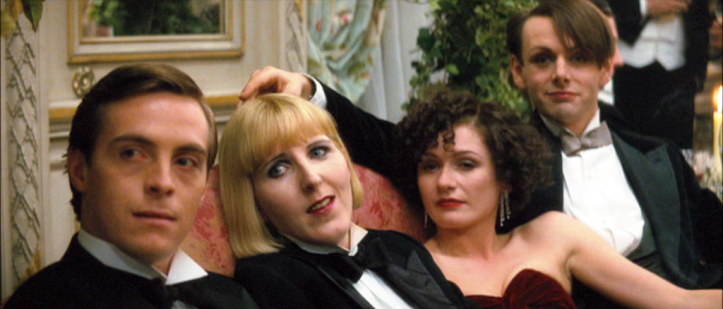I’d like to like Mr Fry’s directorial debut, but it has so many problems that I hardly know where to begin.
The cinematography is meant to be wild and wacky but the tricks are so half-hearted that they’re just distracting. I’m not saying Stephen should have pulled a full Baz Luhrman, but though he says he wanted to keep the film from looking like a typical period drama, there’s not enough imagination on display to make it truly distinctive or exciting.
The story itself is unfocused and I was constantly unsure of who I was supposed in invest in and which goals I should want them to achieve. There’s too many characters, and casting a lot of them with actors like Richard E. Grant, Imelda Staunton and Peter O’Toole only calls attention to how pointless the parts are. They may mean something for people who have read Waugh’s Vile Bodies, but that’s going to be a minority of this film’s audience.
 And then suddenly, it’s World War Two! Not only has there been just the slightest premonition that the bright young things are living in a finite bubble of frivolity, this turn comes far too late in the story for it to be fully explored or have any real impact. The whole ending is undermined by a time lapse that leads to unearned and unconvincing changes of heart.
And then suddenly, it’s World War Two! Not only has there been just the slightest premonition that the bright young things are living in a finite bubble of frivolity, this turn comes far too late in the story for it to be fully explored or have any real impact. The whole ending is undermined by a time lapse that leads to unearned and unconvincing changes of heart.
The great fatal flaw is that I’m left unsure of whether or not this film is supposed to be comedic. If I have to wonder, it’s already failed.
On the positive side, the performances are mostly quite good, with Fenella Woolgar, Stephen Campbell Moore and David Tennant the standouts. The latter two have just about the only scenes where the dialogue seemed to come alive and the situations, despite their outlandishness, were convincing.
Also, the contrast between the scandalous and playful androgyny of the bright young things and Nina’s overalls, which she wears when she goes to work during the war, is excellent—even if the effect may not have been intentional.
